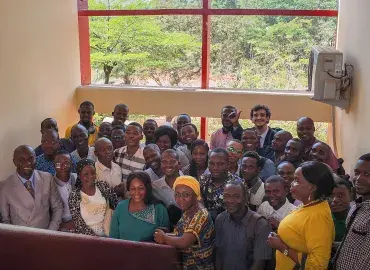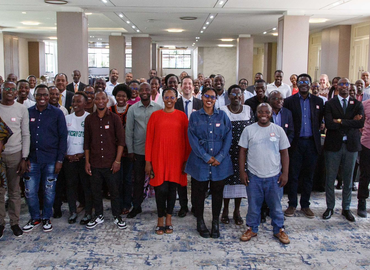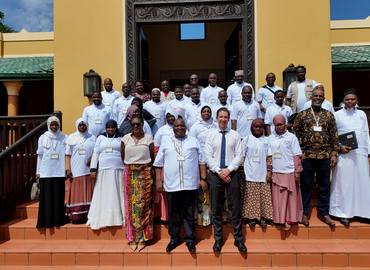"Forgive, Engage, and Keep Engaging": An Interview with Pastor James Wuye

In 1992, Kaduna State in northern Nigeria was rocked by religious violence, pitting Christian and Muslim communities against one another. Pastor James Wuye, an Assemblies of God pastor, and Imam Muhammad Ashafa led opposing militia groups, intent on killing one another in the name of religion. Both men paid a heavy price.
As a result of the violence, Imam Ashafa lost two of his brothers and Pastor James lost his hand. Despite the hatred that once separated them, the former mortal enemies agreed to meet in person in an attempt to rebuild communities torn apart by conflict.
In 1995, they established the Interfaith Mediation Centre (IMC), a religious grassroots organization supported by The Interreligious Dialogue Centre (KAICIID), which successfully mediates between Christian and Muslim communities across Nigeria.
In this interview, Pastor James outlines the IMC’s current efforts to end interreligious violence and bring reconciliation, both in Nigeria and around the world.
How did conflict in Nigeria lead to the establishment of the Interfaith Mediation Centre (IMC)?
In 1992, riots broke out in Kaduna State. After three days of violence, several hundred people were killed, and places of worship were destroyed by the hundreds. We discovered that 777 churches had burned down, and about 600 mosques.
The IMC began work when the environment was full of mistrust. The religious communities were not united. Killing was rampant at the slightest provocation. Christians and Muslims were at each other’s throats. Because we were competing over space, politics and culture, interfaith dialogue was lost.
At this point, we started a discussion between the two faith groups. It was very difficult. There was a fatwa on Imam Ashafa for engaging with the Christians. On my side, a group of Evangelicals told me they didn’t like the interfaith dialogue we were doing.
What has changed since you established the IMC in 1995?
There has been a great improvement because now people like the President of the Christian Association of Nigeria are coming together with the leaders of Muslim groups. Before we started, this never would have happened. There is now an increase of interfaith initiatives in Nigeria. It’s been very helpful because during political conflicts, they’ll use interreligious dialogue to douse the tension, such as with issues from the farmer-pastoralist conflict. But the interfaith initiatives need some kind of mentoring, which we are doing now.
The IMC was involved in the establishment of the KAICIID-supported Interfaith Dialogue Forum for Peace in Nigeria. What value does the IDFP bring to interreligious dialogue in Nigeria?
The selection of the members of the IDFP was deliberate. We chose representatives from the high level, the intermediate level and the grassroots level, in order to reach more people through these three structures of leadership. They are particularly good at going to the field and engaging pragmatically to address challenging issues.
What are the greatest challenges associated with interreligious dialogue in Africa these days?
The question is pertinent. If you talk about challenges in Africa generally speaking, it is important for Africans to begin to engage at both the national and regional levels. The regional levels should focus on dialogue and preventing hate speech. There are other areas that interreligious dialogue can support, which include initiatives on ecological and climate issues, which are affecting violent conflicts here – like the farmer-pastoralist conflict and the issue of deforestation of the region. Also, the issue of migration, due to the ecological challenges, is something that we must confront, that we must confront urgently, and then we must soften the terrain, soften the platform for genuine dialogue among people. These issues will inevitably snowball into pockets or clusters of intervention that can bring realistic and measurable impact on the continent of Africa. We should use dialogue urgently as a tool.
You spoke about the need to prevent hate speech – how do you address this through your work?
We have already put an early warning and response system in place. Our early response team analyses the hate speech and then sends out messaging to counteract that hate speech. They are trained in social media, so we have a huge department whose responsibility is to recognise and address the challenges. We have been very effective in reducing issues that would have caused violence.
There was reported destruction of a mosque in South Nigeria by the government, but we investigated, and when we found out that it was not actually a mosque that was destroyed then we quickly went out and counteracted it. We react quickly to rumours by clarifying, validating and authenticating the rumour and then spreading what is correct. That is the way we do it: rephrasing the situation to reduce the tension; using words that are more inclusive and sensitive. We are working to scale our efforts up further, to share information with relevant agencies of security and civil society.
You recently visited Christchurch, New Zealand. What was your message to those still experiencing trauma following the terrorist attack there in March 2019?
After the attacks, the Christians showed up with food and resources. For many of the Christians, it was their first time working with the Muslims, so we gave them some basic tips. We said to them, okay, if this happened in Christchurch, then you need to also engage with other people. Also, our strategy is to train the security structures in New Zealand. They are saying that they would like us to come back there to do some training with the police. So for me the message from us was “forgive, engage, and keep engaging”. In that way, some of the phobias will die naturally. We left there with a message of forgiveness and reconciliation and reaching out to the vulnerable among themselves.
Since 2015, there has been a strong link between immigration and an increase in anti-Islamic sentiments. What is your advice to policymakers in Europe?
I think first and foremost I’d also say engage in dialogue. Policymakers in Europe should start to engage directly with civil society on the ground in our countries to give capacity in areas to reduce the issue of migration. If the violence within the global south reduces, the influx of people who are leaving their countries to go to Europe will reduce also. Engage the Evangelicals, engage the Muslims, do intercultural dialogue, do youth dialogue, and also ensure that investment is done in our countries and empower the people and civil society. Some of what is transferred to the intergovernmental agencies does not trickle down to the locals. So the best way is to deal with civil society directly and pass all those capacities to the people. This will reduce the number of people who leave their country.
What is the most beautiful aspect of the work you do? What’s the thing that keeps you going?
Change. People are willing to shift positions. Each time you engage, you see repentant people, you see people changing, you see people understanding, and then they turn away from hatred and they begin to embrace each other. And what also motivates me is to see that people are willing to take initiative across red lines. The more you see people change, the happier you are, and that is the fuel the keeps us going.

As the Sustainable Development…


